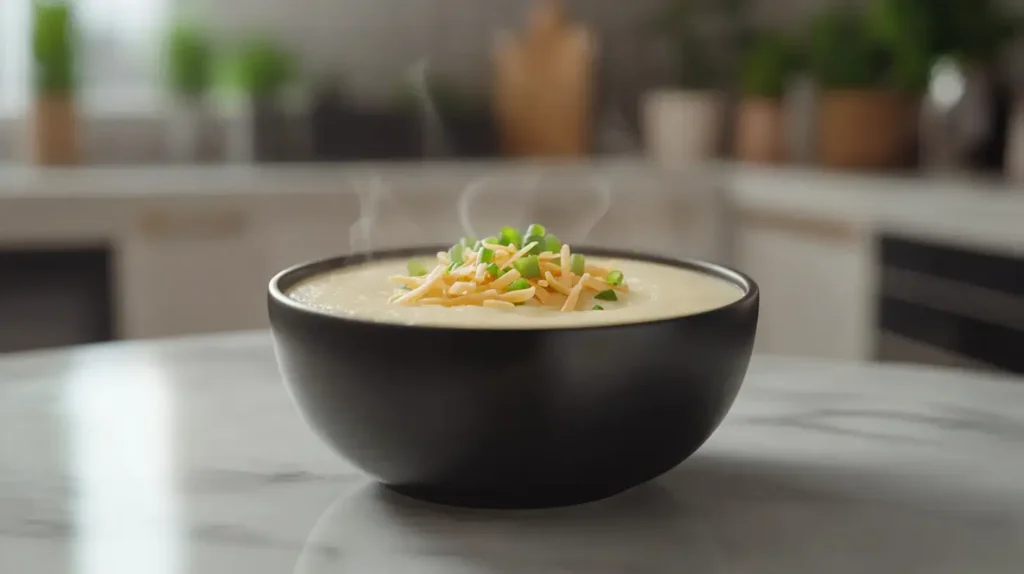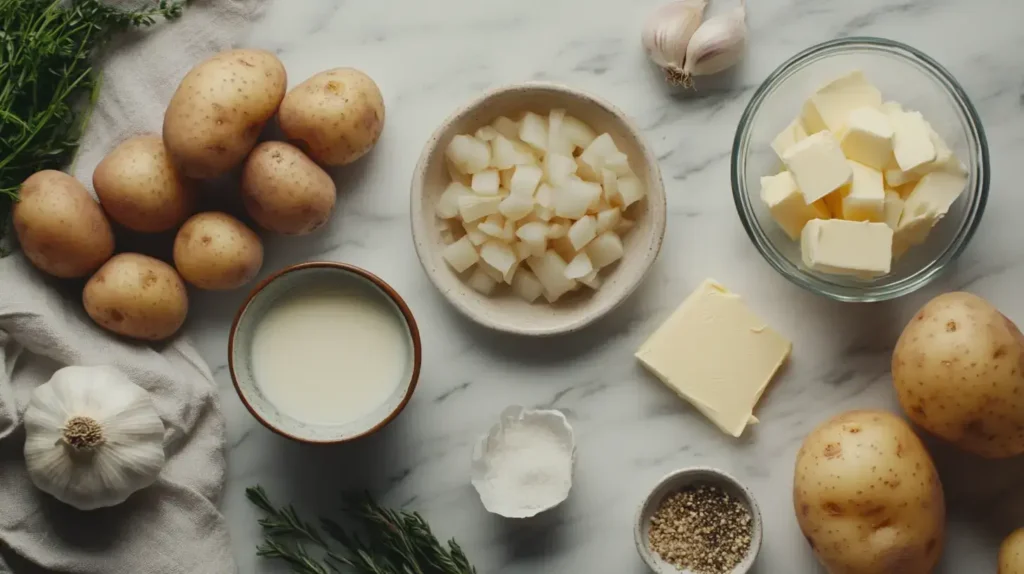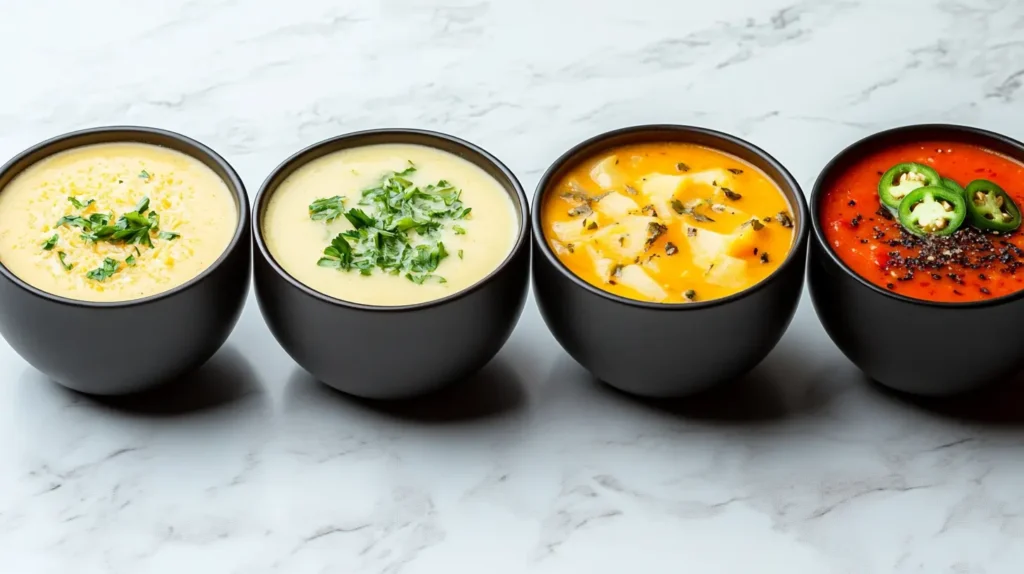
There’s nothing quite like a warm, comforting bowl of potato soup on a chilly evening. This rich and creamy dish has been a staple in kitchens around the world, offering a perfect blend of simplicity and flavor. Whether you’re looking for a quick dinner, a cozy weekend meal, or a dish that can be customized to fit your taste, this potato soup recipe has you covered.
In this article, we’ll walk you through everything you need to know to make the best homemade potato soup—from choosing the right potatoes and thickening techniques to variations and common mistakes to avoid. We’ll also cover essential seasonings, the best side dishes to pair with your soup, and answer some frequently asked questions.
Now, let’s dive into Part 1: what makes potato soup such a beloved comfort food.
What Makes Potato Soup a Classic Comfort Dish?
There’s something special about potato soup—it’s creamy, hearty, and incredibly satisfying. Unlike other soups that require complex ingredients or long cooking times, this dish relies on a handful of simple staples that come together effortlessly. The velvety texture combined with mild yet savory flavors makes it a go-to comfort meal for many.
Potato soup’s versatility is another reason it’s a favorite. It can be made thick and rich or light and brothy, depending on your preference. Plus, it’s easily adaptable for different dietary needs—whether you prefer a vegetarian version or need a dairy-free alternative, there’s a way to make it work for you.
Why You’ll Love This Easy and Creamy Potato Soup Recipe
If you’re a fan of easy-to-make, one-pot meals, this potato soup recipe will be your new favorite. Here’s why:
✔ Simple Ingredients: Most ingredients are pantry staples.
✔ Quick & Easy: Ready in under an hour with minimal prep.
✔ Velvety Texture: A naturally creamy soup without heavy cream.
✔ Endlessly Customizable: Add your favorite toppings or extra veggies.
A Quick History of Potato Soup and Its Variations Worldwide
Potato soup has roots in many cultures. In the United States, it’s often made with a thick, creamy base. In Germany and Eastern Europe, versions of Kartoffelsuppe include leeks, carrots, and fresh herbs. Meanwhile, Irish-style potato soup tends to be more rustic, with chunkier potatoes and a lighter broth.
No matter the variation, one thing remains true: potato soup is a dish that brings warmth, nostalgia, and satisfaction to the table.
Essential Ingredients for the Best Potato Soup

A great potato soup recipe starts with the right ingredients. While the dish is simple, using high-quality and well-balanced components ensures the best texture and flavor. Let’s break down the essentials.
The Best Potatoes to Use for Potato Soup
Not all potatoes are created equal when it comes to making soup. The key is choosing starchy or all-purpose potatoes that break down nicely and add creaminess. Here are the top picks:
- Russet Potatoes – High starch content makes them great for a smooth, velvety soup.
- Yukon Gold Potatoes – Naturally creamy and slightly sweet, they hold their shape better.
- Red Potatoes – Less starchy, ideal for a chunkier soup.
Broth Options: Chicken, Vegetable, or Homemade Stock
The base of any good soup is the broth. Store-bought is convenient, but homemade stock offers deeper flavor. Choose from:
- Chicken broth – Classic and adds a mild, savory taste.
- Vegetable broth – Perfect for a vegetarian potato soup.
- Homemade stock – Use leftover bones and veggies for a richer broth.
Dairy Choices: Milk, Heavy Cream, or Dairy-Free Alternatives
Dairy helps achieve that signature creamy consistency. Consider these options:
- Whole milk or heavy cream – Adds richness.
- Half-and-half – A lighter option with great texture.
- Coconut milk or cashew cream – Perfect dairy-free substitutes.
Fresh Herbs and Seasonings to Enhance the Flavor
The right seasonings elevate the taste. Essential additions include:
- Garlic and onions – Build depth and aroma.
- Bay leaves and thyme – Subtle herbal notes.
- Salt and black pepper – Essential for seasoning.
- Paprika or cayenne – Adds warmth without overpowering.
With the perfect ingredients in place, let’s move on to how to make this delicious soup from scratch.
Step-by-Step Guide to Making Potato Soup
Ready to make the ultimate creamy potato soup? Follow this simple, foolproof method to achieve a flavorful, comforting bowl.
Step 1: Prepping the Ingredients (Chopping and Dicing Tips)
Start by gathering all your ingredients. Peel and dice the potatoes into small, even cubes to ensure they cook evenly. Chop the onions, garlic, and any additional vegetables (like carrots or celery) finely for a smooth, well-balanced texture.
Step 2: Sautéing Onions, Garlic, and Other Aromatics
In a large pot, melt butter or olive oil over medium heat. Add the chopped onions and cook until soft and translucent (about 3–4 minutes). Stir in the garlic and cook for another minute until fragrant. If using other aromatics like celery or carrots, add them now and let them soften.
Step 3: Cooking the Potatoes Until Tender and Flavorful
- Pour in your broth of choice and bring to a gentle boil.
- Add the diced potatoes, bay leaves, and any additional seasonings.
- Reduce the heat and let it simmer for 15–20 minutes, or until the potatoes are fork-tender.
Step 4: Blending for a Smooth or Chunky Texture
Depending on your preference, you can either:
✔ Use an immersion blender to blend some (or all) of the soup for a creamy finish.
✔ Leave it chunky for a rustic feel.
✔ Mash a portion of the potatoes with a fork for a balance of textures.
Step 5: Adding the Final Touches (Herbs, Cheese, and More)
Once blended to your desired consistency:
- Stir in milk, cream, or a dairy-free alternative for extra richness.
- Add grated cheese (like sharp cheddar) if desired.
- Taste and adjust seasoning, adding salt, black pepper, or paprika as needed.
Now your potato soup is ready to be served! Garnish with fresh herbs, green onions, or a sprinkle of shredded cheese.
How to Thicken Potato Soup Without Losing Flavor
A perfectly thick and creamy potato soup recipe doesn’t have to rely on heavy cream alone. There are several techniques to achieve a rich texture without sacrificing flavor. Here’s how to do it.
Flour and Butter Roux: A Classic Thickening Method
One of the most traditional ways to thicken soup is by making a roux:
- Melt 2 tablespoons of butter in a separate pan over medium heat.
- Stir in 2 tablespoons of all-purpose flour and cook for about 1–2 minutes until it turns golden brown.
- Gradually whisk in a ladle of broth from your soup to prevent lumps.
- Once smooth, add the roux back into the soup and stir well.
This method gives the soup a silky texture and enhances the depth of flavor.
Cornstarch Slurry: A Quick and Easy Alternative
If you prefer a gluten-free thickener, a cornstarch slurry works well.
- Mix 1 tablespoon of cornstarch with 2 tablespoons of cold water in a small bowl.
- Stir it into the soup and let it simmer for 5 minutes until thickened.
Cornstarch doesn’t add extra flavor, so it’s a great option if you want a neutral thickener.
Blending a Portion of the Soup for a Naturally Creamy Texture
For a more natural approach, you can blend part of the soup:
✔ Use an immersion blender to blend half the soup while leaving some chunks.
✔ Remove a few cups of soup, blend it in a regular blender, then mix it back in.
This technique maintains the soup’s potato-forward flavor without needing extra thickeners.
Using Mashed Potatoes or Heavy Cream for Extra Richness
- If your soup feels too thin, try mashing some potatoes directly into the pot.
- For an extra indulgent texture, stir in heavy cream or full-fat coconut milk at the end.
With these easy tricks, your potato soup recipe will have the perfect consistency without losing its delicious taste.
Delicious Variations of Potato Soup

One of the best things about a potato soup recipe is how adaptable it is. Whether you like it classic, vegetarian, or with a spicy kick, there’s a version for everyone. Let’s explore some popular variations!
Classic Creamy Potato Soup with Cheddar Cheese
For a rich and cheesy twist, add shredded sharp cheddar cheese to your soup. Here’s how:
✔ Stir in 1–2 cups of shredded cheddar while the soup is warm.
✔ Let it melt completely for a smooth, cheesy consistency.
✔ Garnish with extra cheese and chopped green onions for a bold finish.
Vegetarian Potato Soup with Extra Veggies
Want to pack in more nutrients? Add extra vegetables to your soup for a hearty, plant-based version.
- Include diced carrots, celery, and bell peppers for more flavor and texture.
- Swap chicken broth for vegetable broth to keep it fully vegetarian.
- Top with fresh parsley and a drizzle of olive oil for a vibrant finish.
Dairy-Free and Vegan-Friendly Potato Soup Options
If you’re avoiding dairy, you can still enjoy a creamy potato soup recipe without traditional milk or cheese.
✔ Use coconut milk or cashew cream for a velvety texture.
✔ Blend in nutritional yeast to add a cheesy, umami flavor.
✔ Garnish with toasted nuts or crispy chickpeas for crunch.
Spicy Potato Soup with Jalapeños or Smoked Paprika
For those who love bold flavors, a spicy version of potato soup is a must-try.
🔥 Add diced jalapeños or a pinch of cayenne pepper for heat.
🔥 Stir in smoked paprika to give the soup a deep, smoky flavor.
🔥 Serve with a dollop of Greek yogurt or avocado slices to balance the spice.
These variations prove that potato soup is a versatile, comforting dish that can be customized to your liking.
fitfreshrecipes.com/perfect-potato-soup-recipe-quick-and-creamy-delight/↗
For more delicious recipes, check out the Perfect Potato Soup Recipe on Fit Fresh Recipes
Best Side Dishes to Serve with Potato Soup
A warm and creamy potato soup recipe is satisfying on its own, but pairing it with the right side dish can take your meal to the next level. Whether you prefer something crispy, fresh, or cheesy, here are the best side dishes to serve with your soup.
Homemade Crusty Bread or Dinner Rolls
Nothing complements a creamy soup better than freshly baked bread. The contrast of soft, fluffy rolls or crunchy sourdough against the smooth soup makes for a perfect bite. Try:
✔ Garlic bread – Adds extra flavor with butter and herbs.
✔ Ciabatta or baguette – Perfect for dipping into the soup.
✔ Soft dinner rolls – Light and airy, great for soaking up every last drop.
Fresh Green Salads for a Lighter Meal
If you want to balance the richness of potato soup, a crisp green salad is a great option. Some refreshing combinations include:
🥗 Spinach and arugula salad with lemon vinaigrette.
🥗 Caesar salad with crunchy croutons and parmesan.
🥗 Apple and walnut salad for a mix of sweet and savory.
Roasted Vegetables for Extra Nutrients
A side of roasted vegetables adds color and texture to your meal. Roasting brings out natural sweetness while keeping them crispy. Try:
✔ Brussels sprouts with balsamic glaze.
✔ Carrots and parsnips roasted with honey.
✔ Asparagus with a squeeze of lemon.
Cheesy Garlic Bread for a Richer Pairing
If you love cheese, then a side of cheesy garlic bread is a must. Simply:
✔ Spread garlic butter on thick bread slices.
✔ Top with mozzarella or cheddar cheese.
✔ Bake until golden and crispy.
Pairing your potato soup recipe with these side dishes ensures a well-rounded, comforting meal every time.
Common Mistakes to Avoid When Making Potato Soup
Even the best potato soup recipe can go wrong if a few key steps are overlooked. Here are the most common mistakes and how to fix them.
Using the Wrong Type of Potatoes for the Desired Texture
Not all potatoes work the same way in soup!
- Russet potatoes break down easily, creating a smooth, thick soup.
- Yukon Gold potatoes hold their shape better, making them ideal for a chunkier texture.
- Red potatoes stay firm and work best in brothy soups.
Choosing the right variety makes all the difference in achieving the consistency you want.
Overcooking or Undercooking the Potatoes
Timing is crucial.
- Overcooked potatoes turn mushy and can make the soup grainy.
- Undercooked potatoes leave an unpleasant bite.
To avoid this, simmer gently for 15–20 minutes and check for fork tenderness before blending.
Not Seasoning Properly for Depth of Flavor
A bland soup is disappointing. While potatoes are mild, they absorb flavors well, so be generous with:
✔ Salt and black pepper – Enhances natural flavors.
✔ Garlic and onion powder – Adds depth.
✔ Fresh herbs like thyme or parsley – Elevates taste.
Always taste and adjust seasonings before serving.
Adding Dairy Too Soon and Causing Curdling
Adding milk or cream when the soup is boiling can cause it to curdle. Instead:
✔ Remove the soup from heat before stirring in dairy.
✔ Use room-temperature cream to prevent shock.
✔ Add slowly while stirring for a smooth, creamy consistency.
Avoiding these mistakes ensures your potato soup recipe turns out flavorful, creamy, and perfectly cooked every time.
Frequently Asked Questions (FAQs)
Making the perfect potato soup recipe can raise a few questions. Below, we answer some of the most common ones to help you get the best results.
What Are the Ingredients in Potato Soup?
A classic potato soup recipe includes simple ingredients that create a creamy, hearty dish. The essentials are:
✔ Potatoes – Russet or Yukon Gold work best for a creamy texture.
✔ Broth – Chicken or vegetable broth adds depth.
✔ Aromatics – Onion and garlic bring flavor.
✔ Dairy – Milk, cream, or a dairy-free alternative for richness.
✔ Seasonings – Salt, black pepper, thyme, and bay leaves enhance the taste.
Optional ingredients like cheese, carrots, or celery can add extra flavor and texture.
What Is the Best Thickener for Potato Soup?
There are multiple ways to thicken a potato soup recipe without losing its flavor:
✔ Blending some of the soup naturally thickens it without extra ingredients.
✔ Making a roux with butter and flour adds richness.
✔ A cornstarch slurry (cornstarch mixed with water) thickens the soup quickly.
✔ Mashing some potatoes instead of blending keeps a rustic feel.
Choose the method that best suits your desired texture and consistency.
What Seasonings Are Good in Potato Soup?
Seasoning is key to elevating a simple potato soup recipe. The best choices include:
✔ Salt and black pepper – Essential for balance.
✔ Garlic and onion powder – Adds depth to the broth.
✔ Paprika or cayenne pepper – Brings warmth and a subtle kick.
✔ Fresh herbs like thyme or parsley – Adds a pop of freshness.
For a bolder taste, smoked paprika or nutmeg can bring a unique twist.
What Is the Secret Ingredient in Soup?
A secret ingredient can take your potato soup recipe from good to amazing. Here are a few game-changers:
✔ A splash of lemon juice – Brightens up the flavors.
✔ A dash of Worcestershire sauce – Adds umami depth.
✔ A spoonful of sour cream – Enhances creaminess and tang.
✔ A touch of nutmeg – Subtly boosts warmth and richness.
These little additions make a big difference in overall taste.
Nutritional Information for Potato Soup (Per 100g)
If you’re curious about the nutritional breakdown of a classic potato soup recipe, here’s a general estimate based on a traditional creamy potato soup made with broth, potatoes, milk, and seasonings.
Nutritional Content (Per 100g Serving)
Below is the approximate nutritional value of homemade potato soup. Keep in mind that actual values may vary based on ingredients and portion sizes.
| Nutrient | Amount (Per 100g) |
|---|---|
| Calories | 70 kcal |
| Carbohydrates | 10g |
| Protein | 2g |
| Fat | 3g |
| Saturated Fat | 1.5g |
| Fiber | 1g |
| Sodium | 250mg |
| Calcium | 40mg |
| Iron | 0.4mg |
How to Make Your Potato Soup Healthier
If you’re looking for a lighter version of this soup, here are some easy swaps:
✔ Use low-fat milk or a dairy-free alternative instead of heavy cream.
✔ Choose vegetable broth for a lower-calorie, plant-based option.
✔ Increase fiber by leaving the potato skins on.
✔ Reduce sodium by using homemade broth or low-sodium store-bought versions.
Now that you have all the details, you’re ready to enjoy a delicious, nutritious bowl of homemade potato soup!
A well-made potato soup recipe is one of the ultimate comfort foods, offering warmth, creaminess, and versatility in every bowl. Whether you prefer a classic version, a dairy-free option, or a spicier twist, this simple yet satisfying soup can be customized to your taste.
We’ve covered everything—from selecting the right potatoes and thickening techniques to the best seasonings and side dishes. By following these steps and avoiding common mistakes, you can create a perfect bowl of potato soup every time.
Here’s a quick recap of what makes a great potato soup recipe:
✔ Choose the right potatoes for your desired texture.
✔ Use broth, aromatics, and dairy for depth and richness.
✔ Experiment with seasonings and toppings to enhance flavor.
✔ Thicken naturally with blending, roux, or mashed potatoes.
✔ Pair with fresh bread, salad, or roasted veggies for a complete meal.
With these tips in hand, you’re ready to make the best potato soup ever! Grab a spoon, serve up a warm bowl, and enjoy this timeless comfort food.
